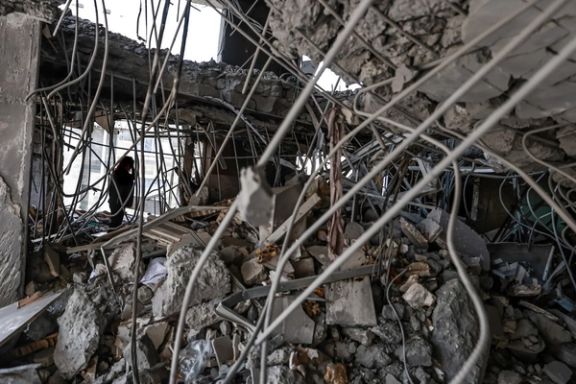Watching war from afar: Iranian diaspora grief is real

Watching Iran burn from afar creates a unique kind of anguish—a sense of guilt that you’re free and safe while your homeland is in pain.

Watching Iran burn from afar creates a unique kind of anguish—a sense of guilt that you’re free and safe while your homeland is in pain.
As someone who lived through the Iran-Iraq War and now works as a trauma-informed grief and anxiety counselor, I’ve felt both sides of this reality—the trauma of conflict and the quiet torment of safety, watching loved ones suffer from a distance.
For many Iranians in the diaspora, the images flooding our screens—of women removing their hijabs, of protesters facing violence, of families torn apart—rekindle our own memories of fear and loss.
If you’ve fled to safety and now witness the struggle through your screen, know this: your pain is real, your feelings valid. You are not alone.
The surreal reality of distance
There’s something disorienting about watching your homeland’s suffering while living in freedom. You might scroll through news obsessively, heart racing with each update.
Drinking your morning coffee while reading about another protester’s death or celebrating your child’s milestones while Iranian children face fear can create a jarring emotional split.
You may feel guilty for the freedoms you now enjoy, relive past traumas or find yourself emotionally transported back to earlier moments of fear and helplessness.
For many, simply navigating daily life while carrying the emotional weight of a distant crisis can be overwhelming.
Understanding diaspora trauma
The trauma felt in exile is layered and often misunderstood. Relief and guilt coexist—grateful to be safe, yet emotionally anchored to a country still suffering.
This survivor’s guilt is hard to shake when the crisis back home hasn’t ended.
Photos of crackdowns, arrests, or even the Iranian flag may evoke grief. Persian news broadcasts, protest chants or traditional music can trigger memories of fear or loss.
Well-meaning comments like “at least you’re safe” may feel dismissive and isolating. And the challenge of reconciling your identity with how Iran is portrayed in the media can deepen the sense of disconnection.
Survivor’s guilt, silent shame
You may wonder why you deserve freedom when others don’t. Everyday joys—walking outside unveiled, speaking freely, or laughing aloud—can feel laced with shame.
The belief that you’re not doing “enough” to help those still struggling can intensify that guilt. The privilege of safety and agency, once hard-won, may suddenly feel too heavy to carry.
Even in safety, your body may react as if under threat.
This is secondary trauma—when witnessing violence affecting your community triggers real psychological responses: flashbacks, insomnia, numbness, anxiety.
Your body is trying to stay connected to those you’ve left behind, even if it can’t protect them.
Grounding in the present
When emotions become overwhelming, grounding techniques can help return you to the present moment.
One simple method is the 5-4-3-2-1 sensory technique, which gently anchors you through what you can see, touch, hear, smell, and taste:
Five things you can see: A window, a tree, a book, a rug, etc. 4 things you can touch: Clothing, floor, cup, chair. 3 things you can hear: Birds, traffic, your breath. 2 things you can smell: Tea, candle, your shirt. 1 thing you can taste: Water, gum, tea.
It’s especially helpful when anxiety or distress feel like too much to bear. Each sensory cue offers a small reminder: you are here, and you are safe.
Breath and affirmation
Another powerful tool for managing intense emotion is breathwork paired with gentle affirmations.
Begin by placing a hand on your chest or belly. Inhale slowly through your nose to a count of four, pause for a moment, then exhale gently through your mouth for a count of six. Let your breath settle into a rhythm.
As you breathe, repeat calming words to yourself: I am here. I am safe. This is now. You might remind yourself, My freedom honors those still fighting, or My survival is not betrayal—it is resilience.
These affirmations are not meant to erase the pain, but to acknowledge it—and to help you stay rooted in your reality. You carry Iran in your heart.
You can grieve and still build a meaningful life. Breath by breath, you remind your nervous system that you are allowed to heal.
Healing together
Living between two worlds can be confusing and lonely—but healing doesn’t mean letting go of who you are. Both identities can coexist.
Making Persian food while playing Googoosh or Dariush, dancing along with pop videos, or wearing a necklace from home can be quiet acts of memory and resilience. They allow you to choose when to share your story and when to simply carry it.
And in that space, both sorrow and joy can safely exist together.
The light that enters
Survivor’s guilt is the shadow of resilience—proof that you care deeply. It’s a heavy ache, a reminder that freedom comes at a cost. But when you name that grief, you create space for compassion, purpose, and solidarity.
As Rumi wrote: “The wound is the place where the light enters you.”
Let that wound become your strength. You are not broken. You are connected. And you are allowed to move forward—carrying Iran with you as you do.